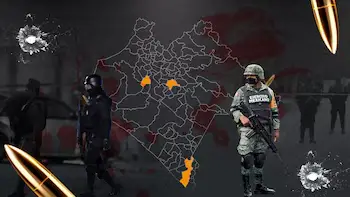The annual National Urban Public Security Survey (ENSU), presented by the National Institute of Statistics and Geography (INEGI), highlights several aspects related to the perception of insecurity among the population during the third quarter of 2024.
One of the most revealing findings is the identification of the municipalities considered the most unsafe in the country, many of which coincide with those having the highest crime rates.
Most Unsafe Municipalities
The survey reveals that assaults and acts of violence are widespread across Mexico, occurring from north to south. The following municipalities are perceived as the most unsafe:
– Tapachula, Chiapas: The most unsafe municipality in Mexico, with 91.9% of the population feeling unsafe on the streets.
– Naucalpan, State of Mexico: One of the most populated municipalities, with 88% of the population feeling insecure.
– Fresnillo, Zacatecas: Previously the most unsafe, now third with 87.9% of the population feeling unsafe.
– Ecatepec de Morelos, State of Mexico: The most populated municipality in the state, with 87% feeling unsafe.
– Irapuato, Guanajuato: 86.4% of the population feels unsafe on the streets.
– Tuxtla Gutiérrez, Chiapas: 85.9% of the population over 18 years old feels unsafe.
Safest Municipalities
The survey also identified the municipalities considered the safest:
– San Pedro Garza García: 13.7% feel unsafe.
– Benito Juárez: 17.5% feel unsafe.
– Tampico: 20.0% feel unsafe.
– Piedras Negras: 20.2% feel unsafe.
– Puerto Vallarta: 21.3% feel unsafe.
– Saltillo: 21.7% feel unsafe.
Consequences of Insecurity
Insecurity in Mexico has a profound impact on its citizens, affecting both quality of life and economic and social development. On a personal level, it generates a climate of fear and constant stress, altering psychological well-being. High crime rates lead people to modify their daily routines, limiting activities and freedom of movement.
Socially, insecurity weakens community bonds, as distrust and fear erode relationships between neighbors and within communities. This compromises social cohesion, affecting citizen participation and the ability of communities to organize for collective solutions.
Economically, insecurity poses a significant obstacle to development. Businesses in highly affected areas face higher operating costs due to additional security measures, discouraging investment and limiting job creation. The tourism sector can also suffer due to the perception of insecurity, reducing the country’s attractiveness to international visitors and affecting income generated by this industry.
Overall, insecurity in Mexico impacts all aspects of life, from individual emotional stability to national economic development.
Source: Infobae






